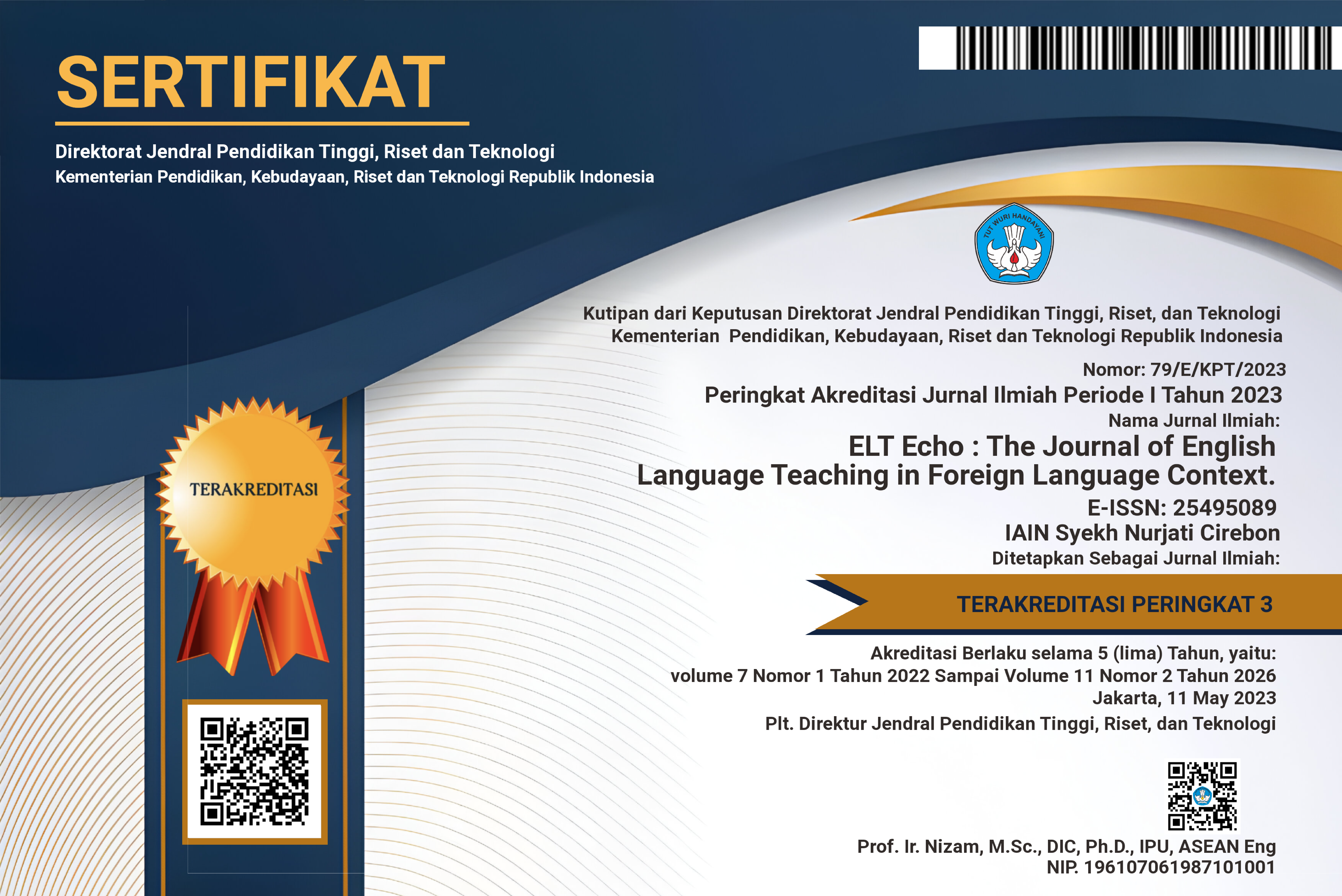Teacher’s Knowledge about Sociolinguistics in EFL Pedagogy. A Study From Classroom Implementation of Curriculum 2013
(1) Sekolah Tinggi Agama Buddha Negeri Sriwijaya Tangerang Banten
(*) Corresponding Author
Abstract
this research article discusses EFL teachers’ knowledge about sociolinguistics in EFL pedagogy that applied in the classical context of English subjects under Curriculum 2013 implementation. One targeted-sample of EFL classroom was observed to explore the focus. Using a qualitative approach, this study had found unique understandings from the participant that deals with their metacognition of sociolinguistics in EFL pedagogy. The knowledge was clustered into Bloom’s taxonomy of knowledge which was considered to be the essential cognition that must be understood by EFL teachers in Indonesia. These knowledge include factual, conceptual, and procedural dimensions. The results of this study provide several pedagogical implications such as revitalizing the orientation of sociolinguistic to attain learning objectives stated in the curriculum, making sense the objectives of English in Curriculum 2013, and re-orienting EFL teachers’ professional development as well as pre-service teachers’ education to engage more on the development of the practices in EFL classroom through the benefits of the knowledge of sociolinguistics in EFL pedagogy.
Keywords
Full Text:
PDFReferences
Baxter, P., & Jack, S. (2008). Qualitative case study methodology: Study design and implementation for novice researchers. The Qualitative Report, 13, 544-559.
Borg, S. (2003) Teacher cognition in language teaching: a review of research on what
language teachers think, know, believe and do. Language Teaching, 36(2), 81-109.
Canale, M. & Swain, M. (1980). Theoretical bases of communication approach to second language teaching. Applied Linguistics, 10, 1-47.
Celce-murcia., Dörnyei, Z., & Thurrel, S. (1991). Strategic competence and how to teach it. ELT Journal Volume, 45, 16-21.
Chodhury, S. (2005). Interaction in second language classrooms. BRAC University Journal, 1, 77-82.
Compernolle, R.A.V. & Williams, L. (2012). Teaching, learning, and developing L2 French sociolinguistic competence. Applied Linguistics, 33 (2), 182-205.
Gobson, C., & Swan, A. (2008). The significances of sociolinguistics background of teachers of IELTS test preparation courses in selected Malaysian institutions. IELTS Report, 8-12.
Genç, G., Kuluşakli, E., & Aydin, Savaş. (2016). Exploring EFL learners’ perceived self-efficacy and beliefs on English language learning. Australian Journal of Teacher Education, 41(2), 53-68.
Hadley, A. O. (2001). Teaching language in context. Boston: Henley & Henley Publisher.
Harmala, M. (2010). Linguistic, sociolinguistic, and pragmatic competence as criteria in assessing vocational language skills: The case of Finland.
Melbourne Papers in Language Testing, 15-27.
McKay, S. L. (2008). It’s certainly been nice to meet youâ€: Using plays to develop sociolinguistic competence. Teacher Talk, 35, 1-7.
Mede, E. & Dikitilas, K. (2015). Teaching and learning sociolinguistic competence: Teachers’ critical perceptions. Participatory Educational Research (PER), 14-31
Moscovici, S., & Vignaux, G. (1994). The concept of Themata. In S. Moscovici & G.Duveen (Eds.), (2000), Social representations: Explorations in social psychology (pp. 156-183). Cambridge: Polity Press.
Qoyyimah, U. (2015). EFL teachers’ professional dilemmas with moral curriculum reform in Indonesia. Unpublished doctoral thesis. Faculty of Education: Queensland University of Technology.
Savignon, S. J. (2007). Beyond communicative language teaching: What’s Ahead?. Journal of Pragmatics, 207-220.
Shumin, K. (2002). Factors to consider: Developing adult EFL students’ speaking abilities In Richards, J. C & Renandya, W.A (Eds). Methodology in Language Teaching. Cambridge University Press.
Turns, S. R. & Meter, P.N.V. (2011). Applying knowledge from psychology and cognitive science to the first course in thermodynamics. Journal of American Society for Engineering Education.
Yu, M.C. (2006). On the teaching and learning of L2 sociolinguistic competence in classroom settings. Asian EFL Journal, 1, 1-13.
DOI: 10.24235/eltecho.v4i2.5265
Article Metrics
Abstract view : 145 timesPDF - 47 times
Refbacks
- There are currently no refbacks.
Â
This Journal is indexed by:
Â

This work is licensed under a Creative Commons Attribution 4.0 International License.










